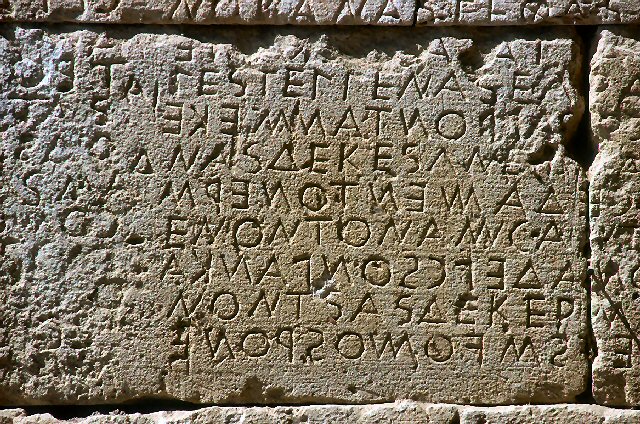Isidore of Seville, Etymologies 6.14:
Previously, librarii were called bibliopolas, because the Greeks call a book a biblion. The same people are called both librarii and antiquarians, but librarii are
those who copy out both old and new things, while antiquarians are
those who write out only the old, from which fact they derive their
name. The scribe has received this name from writing (scribendo), expressing their duty with the quality of the word.
The scribe’s tools are the reed and the
quill, because it is from these tools that words are fashioned on the
page. But the reed comes from a plant, while the quill comes from a
bird; its tip is divided into two, with its unity preserved throughout
its whole form. I think that this is on account of the mystery rite and
signifies the Old and New Testaments on its two points, by which the
sacramen of the word is expressed as it pours forth from the blood of
the Passion.
The reed (calamus) is so called because it lays down its liquid. For this reason, among sailors the word calare
means “to set down”. The quill (penna) however, gets its name from
hanging (pendendo), that is to say, from flying. It is, as I have said,
proper to birds.
The sheets (foliae) of books are so called either from their similarity to the leaves of trees, or because they are made from folles,
that is, from the hides which are typically taken from slain animals.
The parts of these are called pages (paginae) because they are joined
together (compingantur) in turn.
Verses are so called by the
common people because the ancients used to write in the same way that
they ploughed the land. At first, they drew the stylus from left to
right, and then they turned it around on the following line, and then
the succeeding line was again written from left to right. Rustic people
still call these things verses. A scheda is a page which is still being
corrected and not yet put back into the books. This is a Greek word,
just like tomus.

DE LIBRARIIS ET EORVM INSTRVMENTIS.
Librarios antea bibliopolas dictos. Librum enim Graeci BIBLON vocant.
Librarii autem iidem et antiquarii vocantur: sed librarii sunt qui et
nova scribunt et vetera; antiquarii, qui tantummodo vetera, unde et
nomen sumpserunt. Ab scribendo autem scriba nomen accepit, officium
exprimens vocabuli qualitate. Instrumenta scribae calamus et pinna. Ex
his enim verba paginis infiguntur; sed calamus arboris est, pinna avis;
cuius acumen in dyade dividitur, in toto corpore unitate servata, credo
propter mysterium, ut in duobus apicibus Vetus et Novum Testamentum
signaretur, quibus exprimitur verbi sacramentum sanguine Passionis
effusum. Dictus autem calamus quod liquorem ponat. Vnde et apud nautas
calare ponere dicitur. Pinna autem a pendendo vocata, id est volando.
Est enim, ut diximus, avium. Foliae autem librorum appellatae sive ex
similitudine foliorum arborum, seu quia ex follibus fiunt, id est ex
pellibus, qui de occisis pecudibus detrahi solent; cuius partes paginae
dicuntur, eo quod sibi invicem conpingantur. Versus autem vulgo vocati
quia sic scribebant antiqui sicut aratur terra. A sinistra enim ad
dexteram primum deducebant stilum, deinde convertebantur ab inferiore,
et rursus ad dexteram versus; quos et hodieque rustici versus vocant.
Scheda est quod adhuc emendatur, et necdum in libris redactum est; et
est nomen Graecum, sicut et tomus.